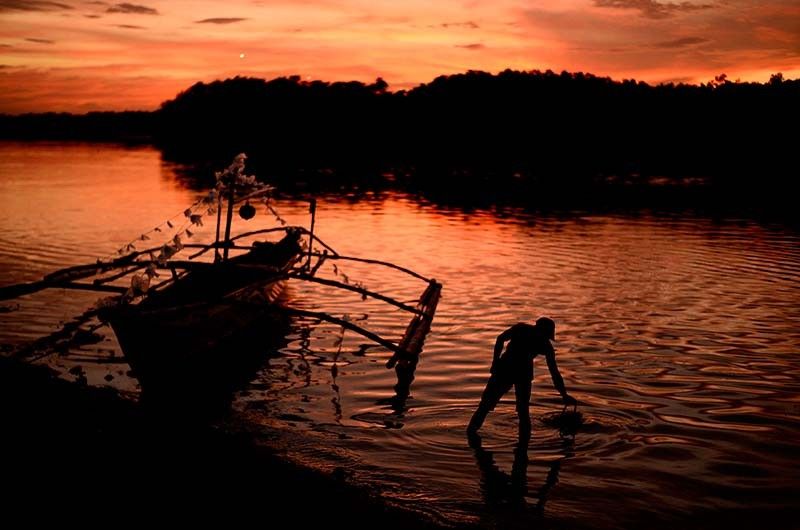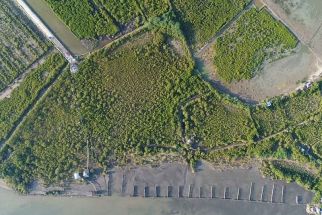Vessel monitoring seen to deter unlawful fishing, protect small fishers

MANILA, Philippines — Small-scale fishermen in marine life-rich Tañon Strait are already content if they catch five kilos a day even if it is nowhere near the 15 to 20 kilos they used to get, said Ven Carbon, a fisherfolk leader in Cebu.
"That’s enough to buy three kilos of rice and a dish," Carbon said. "But crude oil is so expensive right now."
Carbon fishes in the country’s largest marine protected area. Tañon Strait, located between the islands of Cebu and Negros, is a source of food and income for many residents of the central Philippines.
However, the rich fishing ground is also a hotbed of illegal fishing. Large vessels and those with purse seines encroach on Tañon Strait even though they are prohibited from the legally protected seascape.
A large part of the narrow seascape is also reserved for artisanal fisherfolk or those allowed to fish inside municipal waters within 15 kilometers from the shoreline.
"It’s true that our fishing grounds are degraded. The problem is the hauls of commercial fishers are getting bigger, while our catches are getting smaller," Carbon said.
To protect the rights of small-scale fishers—who are among the poorest in the country—and to ensure the seas will restore their bounty, fisherfolk and conservation organizations are pushing for the full implementation of vessel monitoring measures.
"It is important to acknowledge that our ocean is in an alarming state of decline. Vessel monitoring mechanism is among the strong measures to track the identity and location of commercial fishers and deter unlawful fishing behavior," said Gloria Estenzo-Ramos, who heads non-profit Oceana Philippines.
RELATED: Oceana: Commercial fishing boats seen in municipal waters as gov't preoccupied with COVID-19 fight
Monitoring mechanism
The amended Fisheries Code, or the Republic Act 10654, requires commercial vessels to install vessel monitoring measures (VMM) and electronic reporting system (ERS).
VMM refers to any method or system that tracks the position, course and speed of vessels at any given time. It aims to monitor the activities of fishing vessels, their catches and landings, detect illegal, unreported and unregulated (IUU) fishing activities, and manage fisheries resources sustainably.
ERS records, reports, stores and sends fisheries data such as catch, landing and transshipment.
Groups believe the amended Fisheries Code, if fully implemented, ensures the preferential access of and protect the rights of artisanal fishers.
"Science-based management including transparency is essential if we are to bring back the abundance of the ocean and deter illegal fishing and continuing encroachment of commercial fishing vessels in the municipal waters which are reserved for our artisanal fisherfolk," Estenzo-Ramos said.
"These also addresses the inequity, social and climate justice and poverty issues that have hounded our fisherfolk and coastal communities for decades."
However, only 52% of all licensed fishing vessels have vessel monitoring systems, the Bureau of Fisheries and Aquatic Resources said. According to Oceana, there are 3,077 commercial fishing vessels with licenses that are plying the country’s waters.
Unconstitutional?
Fishing companies and associations have opposed the installation of the VMS, saying these might affect their profits because competitors will know where they fish.
In a legal opinion issued on February 7, Solicitor General Jose Calida advised BFAR and the National Telecommunications Commission to comply with the June 1, 2021 ruling of the Malabon City Regional Trial Court that declared Fisheries Administrative Order 266 null and void for being unconstitutional.
The trial court also made permanent its writ of injunction on the implementation of the order.
The administrative order signed by Agriculture Secretary William Dar in October 2020 lists down rules and regulations on the implementation of VMM and ERS.
Oceana and fisherfolk groups appealed the Malabon ruling at the Supreme Court.
Following the OSG's advice, BFAR Director Eduardo Gongona directed the bureau’s regional directors to suspend the implementation of FAO 266 until the Supreme Court reverses the court injunction.
Estenzo-Ramos, an environmental lawyer, stressed orders of an RTC, a court of limited jurisdiction, cannot be implemented nationwide. It added the RTC issuance of injunction is void because it is prohibited from issuing injunctions by the amended Fisheries Code and the Rules of Procedure for Environmental Cases.
Gongona said in a letter to Philstar.com that "[p]ending a resolution by the Supreme Court on the constitutionality of FAO 266, the bureau continues to uphold its mandate in conducting monitoring, control and surveillance to prevent and deter illegal, unreported and uregulated fishing"
He cited the use of visible infrared imaging radiometer suite (VIIRS) night light to detect high radiance lure lights used by fishing boats, deployment of fisheries observers and regular patrolling as other ways to monitor fishing activities.
Gongona said that while those methods help to guard against illegal fishing, these also have "inherent limitations." Patrols and observers, for example, have to physically be in the waters to detect illegal fishing.
"Hence, the use of VMS, which is an internationally recognized tool, permits for a more optimized, innovative and integrated monitoring system that expands and improves the bureau’s current monitoring, control and surveillance program," he said.
‘Kings’ of the sea
Pablo Rosales, who has been fishing in Manila Bay since the 1970s, said commercial fishing vessels "bully" artisanal fishers in municipal waters. In the 1990s, before the country’s Fisheries Code was amended, Rosales’ small boat was hit by a commercial fishing vessel.
"Of course, you will become afraid of them because their vessels are big and carry a lot of people. They are 'kings of the sea' when they move. If you’re in an area where they want to catch fish, they will not respect you," he said.
The national chairperson of PANGISDA-Pilipinas criticized the lack of political will of government officials, and the weak enforcement of laws and regulations that are supposed to protect small fishers like him.
"They just need to implement what is written in the law. Are enforcers really serious in implementing the law?" Rosales said.
For Carbon, the government must provide fisherfolk with financial and livelihood assistance, and capacitate people's organizations to manage the country's waters sustainably.
Fishers are also calling for genuine rehabilitation of the seas through the restoration of coral reefs, seagrass beds and mangroves. They also urged authorities to put an end to reclamation and seabead quarrying.
"Science has long shown that our seas are [being] destroyed, and small fishers are not the only ones degrading it, but also large vessels. The destruction of seas plunges artisanal fishers into poverty and makes wealthy people even richer," Rosales said.
- Latest



























